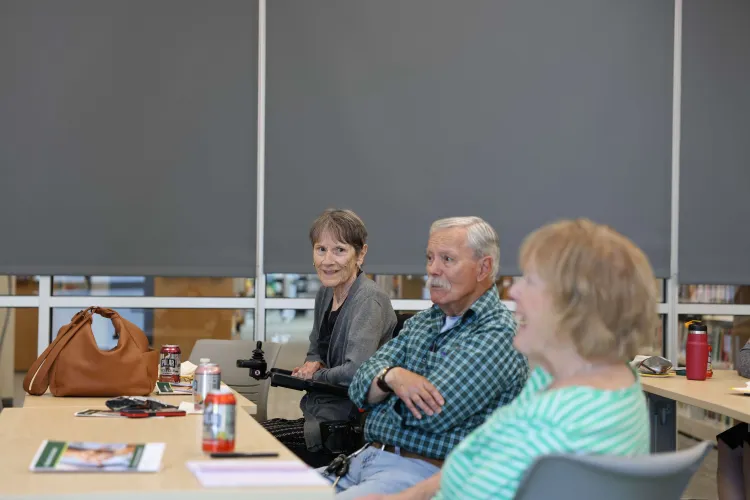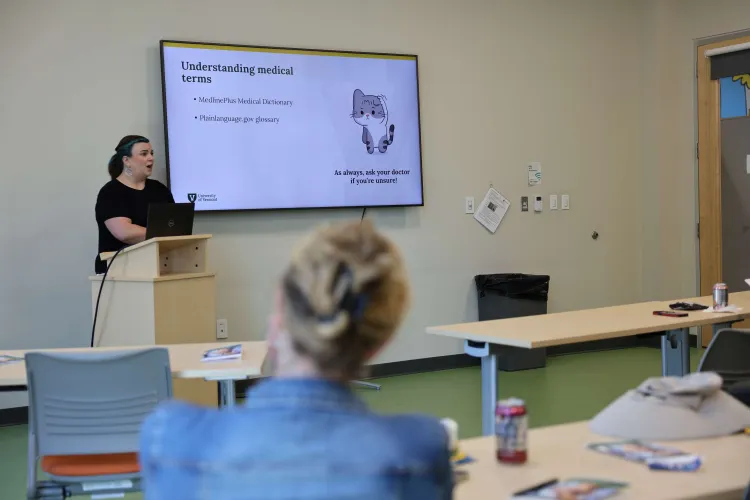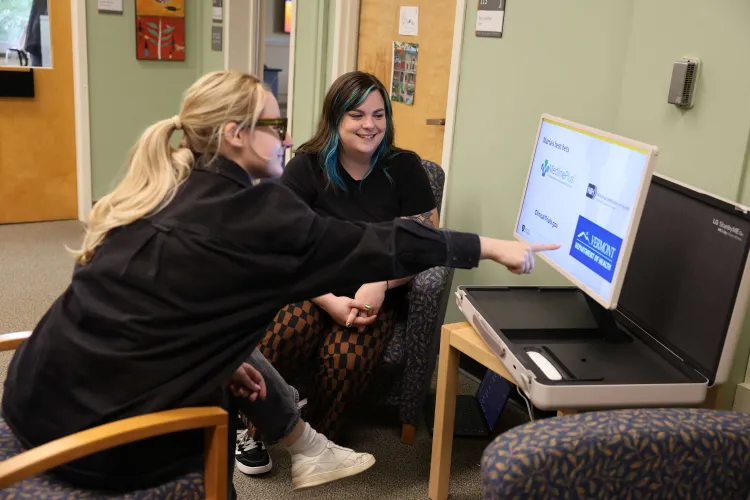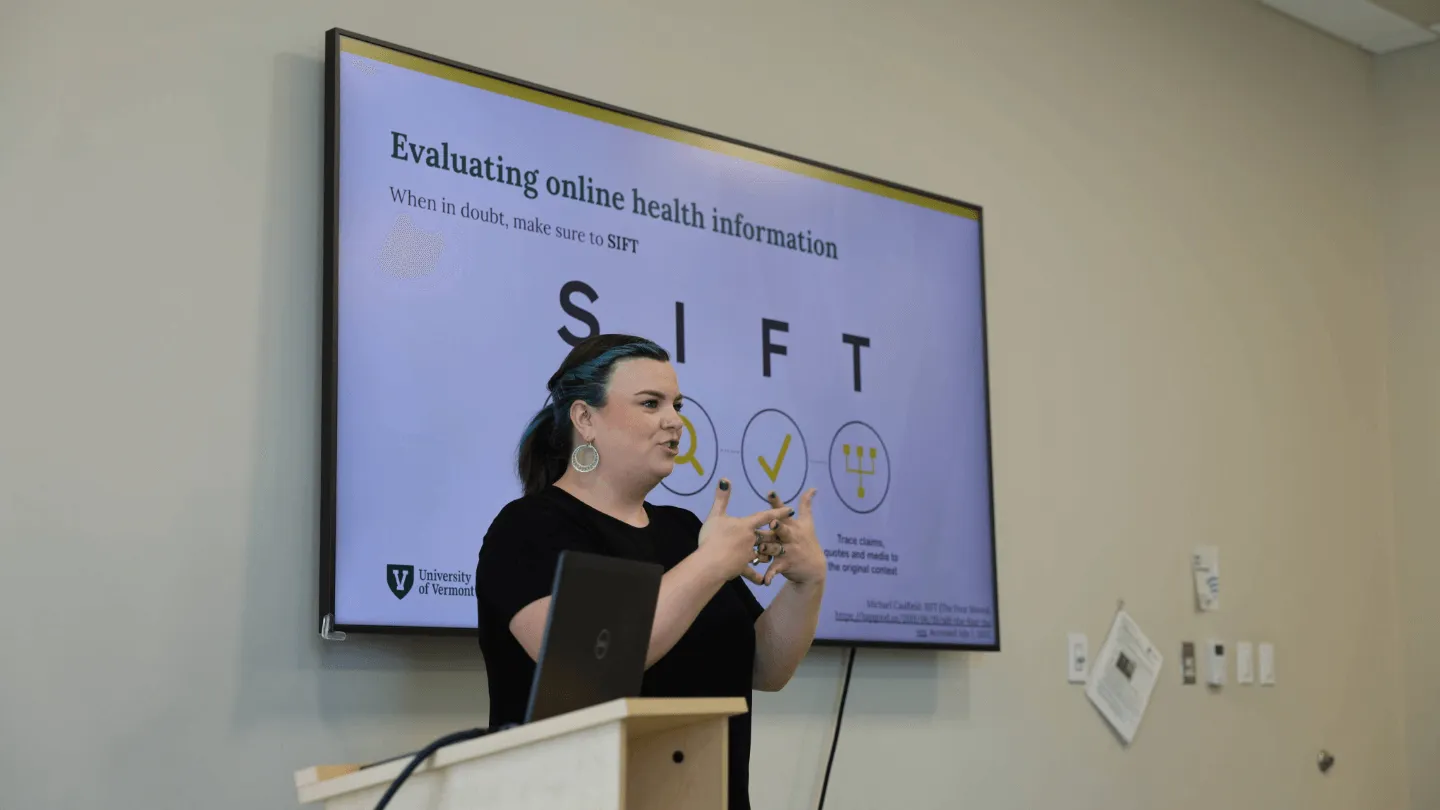Community members recently gathered at the South Burlington Public Library to learn better ways to prepare for medical visits and to find and understand reliable medical information. Speakers Geri Amori, a UVM Medical Center patient and family advisor, and Maria Avery, UVM Libraries community outreach manager, teamed up to offer "Prepare to Get the Care You Need,” one in a series of “Health Bites and Insights” workshops.
“We have these incredible partners in the Community Health Department at UVMMC,” said Meg Thomas, director of outreach and process with the Libraries. “Combining the expertise of a patient advocate and a research expert and meeting the community in the comfort of their own public library to talk about hard things feels impactful and exciting."

Prepare for your medical appointment
“As a former healthcare professional, I noticed that some patients were able to navigate the healthcare system and get their needs met easily while others had trouble. This made me feel powerless,” Amori said as she began with a presentation of ways that attendees can best share information with their practitioners.
Amori shared a slide of Marcus Welby, M.D., the kindly television doctor from the late 1960s. “Do you all remember Marcus Welby? He had all the time in the world to talk to his patients,” the crowd agreed. “Well things have changed.”
Amori went on to share that insurance often dictates the length of a patient visit and therefore patients must make the most of their 15 minutes for a symptom visit by being prepared. Tips that Amori shared included keeping a symptom log, keeping a medication log, preparing questions in advance, engaging in an honest conversation about symptoms up front in the appointment and asking the right questions about treatment plans with their practitioners.

Amori’s point-blank approach proved helpful to the group. She shared that the U.S. has an overall misdiagnosis rate of approximately 10-15%. Not always is this the practitioner’s fault, Amori said. Often times, practitioners will give patients a working diagnosis that patients understand to be a full diagnosis with no follow-up or re-evaluation.
She used this statistic to emphasize the importance of follow-through with your practitioner and to remind listeners that the relationship between practitioner and patient is a partnership.
“The engaged patient remembers that healthcare providers and employees are people too,” said Amori. Having empathy for your provider and being prepared for your appointment is a win-win for both parties.
One participant noted that, before any medical appointment, she likes to ask herself what kind of person she wants to be at the appointment. This moment of mindfulness helps her carry kindness into the meeting, even when she’s nervous or frustrated.
Chrissy Keating, health literacy specialist, UVMMC’s Culture, Experience and Community Health Department, expressed her excitement about this new program and partnership. “One of my department's goals is to work with community partners to identify and address barriers to health,” said Keating. “Our collaboration with the UVM Libraries combines our commitment to patient- and family-centered care with the UVM Libraries' specialization in research. It highlights the importance of providing accessible health education with the ability to find trusted sources of information online. By hosting this workshop at a library, we are meeting people where they're at—right in the heart of their community—and that is something we're very excited about."
Empower yourself through research
Avery took over for the latter half of the workshop to teach attendees how to identify reliable health resources online. Equipped with a specialization in consumer health information from the Medical Library Association, Avery is dedicated to helping the community feel empowered in understanding their health through their own research.
“My goal is to improve your digital health literacy which simply means you improve your ability to find, understand, and use health information and patient resources online,” said Avery to the group. “I also want to make sure you can spot misinformation because there’s a lot of it out there!”

Avery taught attendees the “SIFT” method of identifying reliable online sources. SIFT stands for stop, investigate the source, find better coverage, and trace claims, quotes, and media to the original context.
An example article about liver detox on the blogsite Substack was put to the test by Avery and workshop participants to apply the SIFT method. The group closely examined the article and it’s sources identifying a typo in the author’s biography, a suspicious title and the sources cited turned up as non-existent when the group searched for them. Within just a few minutes, it was clear that the article was click bait – designed to generate clicks by exploiting the reader’s interest or concern, in this case, about their health.
Avery shared a list of trusted sources that patients can use when doing research on their health including Mayo Clinic, MedlinePlus, the National Institutes of Health, PubMed, the Vermont Department of Health, ClinicalTrials.gov, and more.
“Our hope with this program is to alleviate some of the anxiety that both providers and patients face,” Avery said. “We want to give Vermonters the tools they need to have more fruitful medical visits, to find reliable and accessible health information, and ultimately to feel more power and control over their health decisions.”
Join Amori and Avery at an upcoming Health Bites and Insights workshop at these public libraries: Jericho event or Williston event.

Set up a free health literacy workshop
In addition to the UVM Libraries/UVMMC partnership, the UVM Libraries offers many ways to collaborate. Learn more about workshops with Maria Avery. You can also email Maria.
